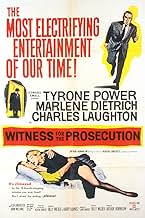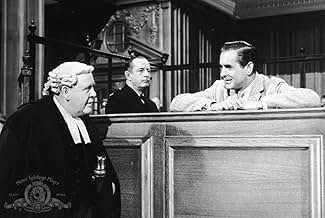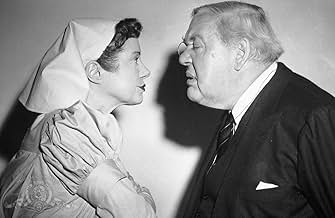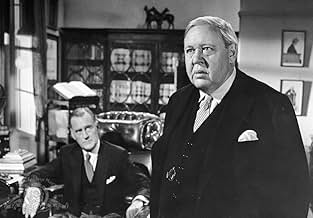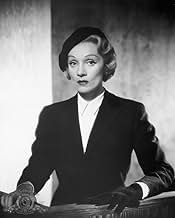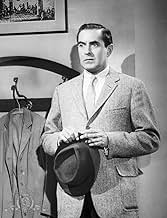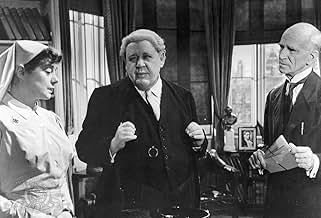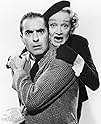Ein erfahrener britischer Rechtsanwalt muss seinen Mandanten in einem Mordprozess verteidigen, der einige Überraschungen auf Lager hat.Ein erfahrener britischer Rechtsanwalt muss seinen Mandanten in einem Mordprozess verteidigen, der einige Überraschungen auf Lager hat.Ein erfahrener britischer Rechtsanwalt muss seinen Mandanten in einem Mordprozess verteidigen, der einige Überraschungen auf Lager hat.
- Für 6 Oscars nominiert
- 3 Gewinne & 15 Nominierungen insgesamt
Patrick Aherne
- Court Officer
- (Nicht genannt)
Don Ames
- Bar Patron
- (Nicht genannt)
Larry Arnold
- Courtroom Spectator
- (Nicht genannt)
Walter Bacon
- Bar Patron
- (Nicht genannt)
Eddie Baker
- Courtroom Spectator
- (Nicht genannt)
Zusammenfassung
Reviewers say 'Witness for the Prosecution' is celebrated for its intricate plot, masterful direction by Billy Wilder, and standout performances by Charles Laughton and Marlene Dietrich. The film delves into themes of justice, deception, and complex human relationships within a gripping courtroom drama. Its twisty narrative and surprising ending are often praised for enhancing suspense and entertainment. Despite minor critiques on pacing and some performances, the overall reception is highly positive, marking it as a genre classic.
Empfohlene Bewertungen
Yours truly has never been much of a reader, though with one notable exception: the work of Agatha Christie. I absolutely, positively worship this brilliant woman and try to read as many of her novels, short stories and stage play adaptations as possible. "Witness for the Prosecution" is a genuine classic, and although somewhat atypical for Christie, it is undeniably one of the greatest stories ever penned down. There's one major disadvantage about having read all of Christie's whodunits, of course, namely that you can't experience the same astounding twist-in-the-end twice! I would really have loved to be overwhelmed by the climax of this film- version, especially because Marlene Dietrich and Tyrone Power give away such fabulous performances. The story, with its fascinating characters and dazzling plot twists, does remain the movie's biggest strongpoint, but there are a number of more reasons why "Witness for the Prosecution" is righteously considered as one of the most massive milestones in cinematic history. Billy Wilder's surefooted direction, for one, and the stellar performances of the entire ensemble cast. I mentioned Dietrich and Power already, but there's also the downright phenomenal Charles Laughton (arguably the most shamefully neglected actor/director in history) and an appealing supportive role for Elsa Lancaster. But do I daresay that the ultimate success-factor of this stage play adaptation is the masterful re-creation of the court trial? The bombastic settings and decors, the echoing acoustics, the powerful monologues of confident (and arrogant) barristers and the intimidating gowns and wigs are largely what make "Witness for the Prosecution" not only the first but also the mother of all courtroom dramas. This may just be the opinion of an avid fan, but practically ALL great courtroom-dramas that were released from the sixties until present day ("To Kill a Mockingbird", "Philadelphia", "Devil's Advocate", "A Few Good Men"
) were clearly influenced by "Witness for the Prosecution". In fact, I only have one minor complaint: *** Spoiler **** the film version adds one more final twist that I didn't find 100% plausible.
To see "Witness for the Prosecution" for the first time in 2008 is a jolting surprise. Nobody could do it better than Billy Wilder did in 1957. A man accused of murder, Tyrone Power, the weakest link in this terrific chain. Sir Wilfred is called to defend him, he is played by the extraordinary Charles Laughton, but he's just out of hospital - he wasn't dismissed he was expelled - and due to doctor's orders he's not to take any criminal cases. He finds Power charming and personable enough but he's not going to risk his life to save his until Marlene Dietrich makes her entrance - and what an entrance! How marvelous that what amounts to a bit of Agatha Christie's usual fare becomes such an entertaining and at times right down riveting piece of film-making.
At the end of the day the films you give top marks are those films that become constant companions. You can see them again at the drop of a hat, you show them to people who have never see them and it's always a triumph. "Witness For The Prosecution" is one of those wonders. Suspend your disbelief for a couple of hours and enjoy this banquet of a romp. Charles Laughton showed here what he was made of better, more clearly and more loudly than in any other film and all of his films, at least the moments with him in it, are unforgettable - Captain Blight or Henry VIII, Quasimodo or that malefic Senator from South Carolina. Here the severity of his lawyer by vocation takes your senses away with his masterful judicial way to see logic and it's such an incredible fun to watch him do it. Tyrone Power is a toy in his hands but not Marlene Dietrich who stands her ground, not merely as a character but as a presence on the screen. Billy Wilder visits early Hitchcock territory with wit and fun. Elsa Lanchester's nurse is the cherry on top of this delightful film.
Witness for the Prosecution is one of the most entertaining courtroom stories of all time, written by the crime mistress herself, Agatha Christie. Charles Laughton completely owns the courtroom, starring as a famously brilliant barrister who's supposed to be taking a break for his health-but he gets drawn in by a truly compelling murder trial. Tyrone Power, in his last movie, has been accused of murdering a wealthy older woman. While all the evidence racks up against him, Charles doesn't give up hope and tries to win the case, all the while trying to crack the very hard nut Marlene Dietrich. Marlene is Tyrone's wife, and it's impossible to tell what she's really thinking or feeling.
I love this story, and I love both versions of the film, from 1957 and 1982. It's incredibly suspenseful and interesting-and also quite impossible to talk about without giving spoilers. If you've never seen Witness for the Prosecution, add this one to your list of classics to rent. The acting is fantastic, and the timing makes it a very entertaining old movie to watch. There are no boring bits in this drama; and I guarantee you'll still sit on the edge of your seat the second time you watch it.
I love this story, and I love both versions of the film, from 1957 and 1982. It's incredibly suspenseful and interesting-and also quite impossible to talk about without giving spoilers. If you've never seen Witness for the Prosecution, add this one to your list of classics to rent. The acting is fantastic, and the timing makes it a very entertaining old movie to watch. There are no boring bits in this drama; and I guarantee you'll still sit on the edge of your seat the second time you watch it.
This is one of the best "trial movies" ever made. It's an outstanding film that is just as good today as it was almost 50 years ago when it was released in the theaters. The shocking ending caused quite a stir back then, too.
The only part of the movie I thought looked dated and unrealistic was Tyrone Power's character being able to interrupt the trial with outbursts and not be reprimanded for it. There is no way that would be tolerated, at least today.
Otherwise, it's a pretty solid film with a good cast that includes two fascinating characters played by actors who know how to entertain: Charles Laughton and Marlene Dietrich.
Laughton, who plays Power's defense attorney, grabs the spotlight in the story but Dietrich almost steals the movie in her role as Power's wife. Laughton's dialog is terrific throughout, bringing a number of laughs to this serious film. He's just a joy to watch. Dietrich is even more riveting but just doesn't have anywhere near the same amount of screen time as Laughton.
Not to be overlooked is Elsa Lanchester, playing Laughton's nurse. She, too, demonstrates her comedic talent and significantly adds to the fun of watching this film.
If you like some fine drama, storyline twists, a little humor thrown in and great acting and dialog, this is a classic film to check out.
The only part of the movie I thought looked dated and unrealistic was Tyrone Power's character being able to interrupt the trial with outbursts and not be reprimanded for it. There is no way that would be tolerated, at least today.
Otherwise, it's a pretty solid film with a good cast that includes two fascinating characters played by actors who know how to entertain: Charles Laughton and Marlene Dietrich.
Laughton, who plays Power's defense attorney, grabs the spotlight in the story but Dietrich almost steals the movie in her role as Power's wife. Laughton's dialog is terrific throughout, bringing a number of laughs to this serious film. He's just a joy to watch. Dietrich is even more riveting but just doesn't have anywhere near the same amount of screen time as Laughton.
Not to be overlooked is Elsa Lanchester, playing Laughton's nurse. She, too, demonstrates her comedic talent and significantly adds to the fun of watching this film.
If you like some fine drama, storyline twists, a little humor thrown in and great acting and dialog, this is a classic film to check out.
Wusstest du schon
- WissenswertesCharles Laughton, who could be moody and difficult, was apparently a dream to work with, throwing himself into the role with dedication and delight. Billy Wilder later recalled a day that was set aside just for shooting reaction shots of the jury and courtroom crowd (composed of extras hired only for the day). Normally, the assistant director would read the actors' lines, and the extras would react. However, Laughton, who was fascinated with the whole process of filmmaking, begged to help. So he came in on his day off and read all of the off-camera speeches to the jury members. He not only read his part but also the judge's, the prosecutor's, and even Marlene Dietrich's. According to biographer Maurice Zolotow in his book "Billy Wilder in Hollywood", "it was an exhibition of craftsmanship such as Wilder had never seen. He believes that Charles Laughton had the greatest technical range and power of any actor, man or woman, whom he has known."
- Patzer(at around 9 mins) Inside his chamber, Sir Wilfrid lights his cigar, and Leonard Vole locks the door to make sure that Miss Plimsoll can't enter the room and catch him smoking. Later (at around 15 mins), Wilfrid leaves his chamber without first unlocking the door.
Actually, Vole does not lock the door, but puts the keyhole cover in place to stop Plimsoll spying through the keyhole.
- Zitate
Sir Wilfrid: I am constantly surprised that women's hats do not provoke more murders.
- Crazy CreditsAs the end credits appear on screen, an announcer's voice is heard: "The management of this theater suggests that for the greater entertainment of your friends who have not yet seen the picture you will not divulge to anyone the secret of the ending of Witness for the Prosecution."
- VerbindungenFeatured in Marlene (1984)
- SoundtracksI May Never Go Home Anymore
Music by Ralph Arthur Roberts
Lyrics by Jack Brooks
Sung by Marlene Dietrich (uncredited)
Reprised a cappella by Tyrone Power (uncredited)
Top-Auswahl
Melde dich zum Bewerten an und greife auf die Watchlist für personalisierte Empfehlungen zu.
Details
- Erscheinungsdatum
- Herkunftsland
- Sprachen
- Auch bekannt als
- Testigo de cargo
- Drehorte
- Produktionsfirma
- Weitere beteiligte Unternehmen bei IMDbPro anzeigen
Box Office
- Budget
- 3.000.000 $ (geschätzt)
- Weltweiter Bruttoertrag
- 7.903 $
- Laufzeit
- 1 Std. 56 Min.(116 min)
- Farbe
- Seitenverhältnis
- 1.66 : 1
Zu dieser Seite beitragen
Bearbeitung vorschlagen oder fehlenden Inhalt hinzufügen

![Trailer [OV] ansehen](https://m.media-amazon.com/images/M/MV5BNTM2MjYzMjAtZjI5MC00YTI1LWI2MzAtMWFlNDc2OTU1MTRiXkEyXkFqcGdeQXRyYW5zY29kZS13b3JrZmxvdw@@._V1_QL75_UX500_CR0)
